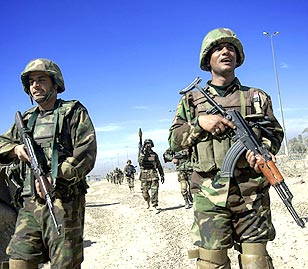Military says 3,700 more troops are headed to Baghdad
 Officials: Not enough troops to fix problems in Iraq
Officials: Not enough troops to fix problems in Iraq Time: Military strategists cook up flawed alternatives
Military says 3,700 more troops are headed to Baghdad
By Tom Lasseter
McClatchy Newspapers
BAGHDAD, Iraq - The Bush administration's decision to move thousands of U.S. soldiers into Baghdad to quell sectarian warfare before it explodes into outright civil war underscores a problem that's hindered the U.S. effort to rebuild Iraq from the beginning: There aren't enough troops to do the job.
Many U.S. officials in Baghdad and in Washington privately concede the point. They say they've been forced to shuffle U.S. units from one part of the country to another for at least two years because there haven't been enough soldiers and Marines to deal simultaneously with Sunni Muslim insurgents and Shiite militias; train Iraqi forces; and secure roads, power lines, border crossings and ammunition dumps.
The U.S. command announced Saturday that 3,700 additional U.S. soldiers are being sent to Baghdad, including two battalions of the Army's 172nd Stryker Brigade, four or five military police companies from northern Iraq and a field artillery battalion that's standing in reserve in Kuwait.
But when U.S. forces have cracked down in one place, Iraqi insurgents and foreign terrorists have popped up in another. Some towns have been pacified multiple times, only to return to chaos as soon as the United States reduced troop numbers. In cities such as Baghdad, Kirkuk, Samarra and Ramadi, bloodshed ebbs and flows, but security is never a given.
Violence takes a toll
The frustration of returning to quell violence in the same places multiple times has taken a toll on U.S. morale, undermined Iraqi confidence in the U.S. and cast doubt on the Bush administration's hopes of beginning significant withdrawals of soldiers and Marines by the end of this election year. There are 130,000 U.S. service members in Iraq, down from 160,000 last December.
"This is exactly what happens when there aren't enough troops: You extend people and you deplete your theater reserve," said a U.S. defense official in Iraq, who spoke on the condition of anonymity.
During embedded reporting trips beginning in the summer of 2003, which included time with troops from eight Army divisions, an armored cavalry regiment and several Marine units, a McClatchy reporter was told repeatedly that more manpower was needed.
U.S. officials in Iraq and in the United States said the shortage stemmed from a number of factors, including:
Defense Secretary Donald Rumsfeld's belief that a small but agile, high-tech U.S. force could topple Saddam's regime, in part because Iraqi exiles had assured the administration that U.S. troops would be greeted as liberators. From the beginning, a number of U.S. officers said, senior White House and Pentagon officials said that post-invasion Iraq would require fewer than 200,000 troops.
The decision early in the U.S. occupation of Iraq, also encouraged by Iraqi exiles, to disband the Iraqi military. This deprived the U.S. of some potential Iraqi allies, and drove some Sunni soldiers and officers into the insurgency.
Rumsfeld's reluctance to increase U.S. deployments in Iraq or the overall size of the Army despite the escalating violence. "It could be two divisions-plus just to secure Baghdad, and you're talking a 10-division Army," said a senior U.S. military official who served in Iraq and is now in the United States.
The inability or unwillingness of many newly trained Iraqi forces to take over security from the United States or even to operate independently, which has dashed the administration's hopes that U.S. troops would stand down as the Iraqis stood up.
The lack of boots on the ground has forced U.S. commanders in many areas to resort to large-scale raids and quick-hit cordons instead of "clear and hold" operations that would shut down an area, piece by piece, and establish security with a dense military presence.
"I'm almost of the view that you've got to bring more troops and they've got to stay longer, but no one wants to hear that," the senior U.S. military official said.
Military silence
Almost no high-ranking, active-duty U.S. officers are willing to discuss their concerns about troop levels publicly, for fear of being reprimanded or having their careers cut short.There's an unwritten understanding, they said, that the Bush administration doesn't want to hear about the need for more troops.
The top U.S. military officer in Iraq, Gen. George W. Casey Jr., has said that such assertions are untrue. When ground commanders ask for more troops, according to Casey, they get them.
But the U.S. defense official in Iraq said officers were discouraged from making such requests, and officers in Washington, D.C., and at the military's Central Command confirmed that.
"They're not allowed to ask for more troops," the U.S. defense official in Iraq said. "If you say something you're gone, you're relieved, you're not in the Army anymore."
A number of senior military officials in the United States agreed.
"There's an overall feeling that if you ask for more you're going to get hammered," one said.
Link Here




0 Comments:
Post a Comment
<< Home